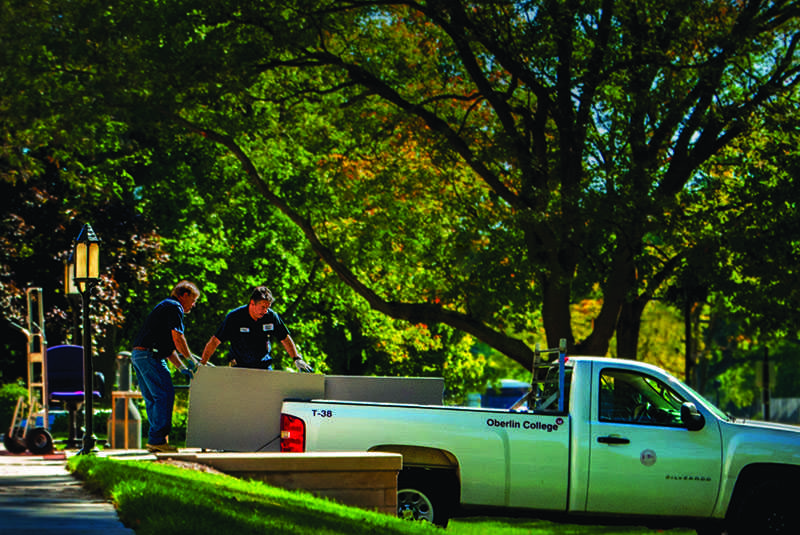UAW, College Gridlocked Over Contract
Benjamin Shepherd, Photo editor
Two facilities workers complete a work order. The College and the UAW have been at loggerheads over an administrative proposal to record how long facilities workers spend completing work orders.
September 25, 2015
The United Auto Workers, the labor union that represents facilities workers, is clashing with Oberlin College over proposed procedural changes. The College’s plan would levy a more rigid time-evaluation system onto UAW employees, which some workers say could result in unfair penalties.
“If you have an assignment that takes on average 30 minutes and someone is taking three days to do it, that’s a problem,” Oberlin UAW Chairman Milton Wyman said. “But if you take 45 minutes, and I take 30 minutes, then they want to start writing you up and possibly disciplining you for it, and that’s what we have a disagreement about.”
The contract between the College and UAW does not currently include a time-evaluation system. Oberlin proposed the revision in March but has been met with strong opposition. The two groups have been engaged in negotiations since the spring and are yet to reach an agreement. The issue is likely to be decided via a third-party arbitrator if a compromise cannot be reached.
A UAW worker, who requested to remain anonymous while disputes are ongoing, said that time evaluations will not always explain the full story and could cause workers to be wrongfully disciplined with anything from a verbal warning for first-time offenses to suspension or termination.
“In a two-hour window, I may not even be doing work orders,” they said. “A lot of the time I’m doing trouble calls or addressing emergencies on campus. You could just isolate all those two-hour windows and say, ‘He’s not being productive. What’s he doing week after week?’”
The two administrative bodies faced similar disputes in 1995 over a potential performance-management system, but UAW members threatened to strike and the College eventually conceded.
A different UAW employee, who also requested anonymity, expressed concern over the effectiveness of the time-evaluation methods. Many factors could contribute to differences in the amount of time required to complete similar tasks, they said. For example, cleaning a small dorm bathroom could take half the amount of time required to clean a locker room bathroom.
“Most of us don’t mind to see [the changes] move forward, but there’s always a fear of how powerful something like that can be,” the employee said. “The [time-management] information can be just as powerful in a positive way, but if the school is truly interested in this information being used in a positive, productive way, I feel that they should provide us the assurance that it is going to be used that way.”
Director of Facilities Operations Keith Watkins, Assistant Vice President for Facilities Thomas Piccorelli and other members of the Oberlin administration did not respond to repeated requests for comment.
















